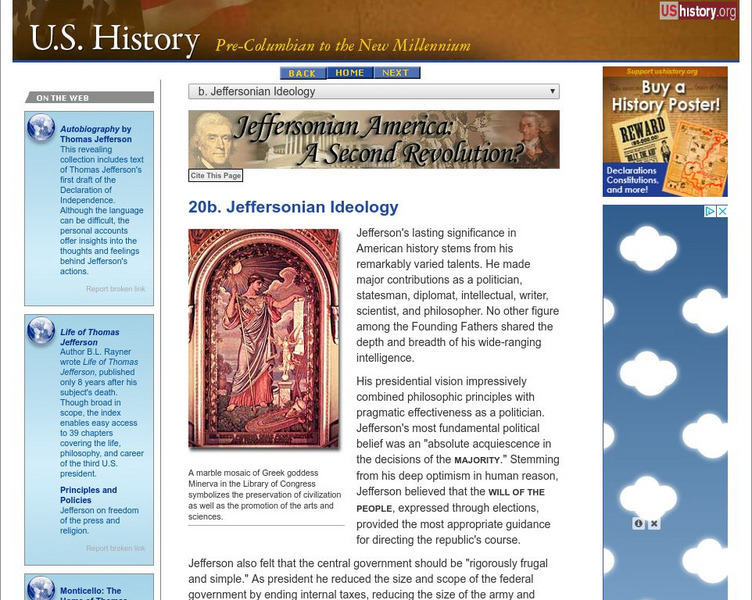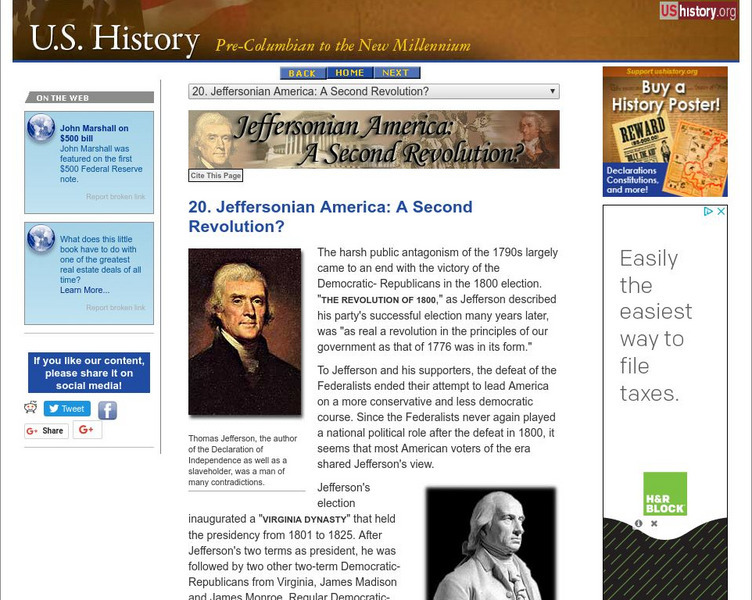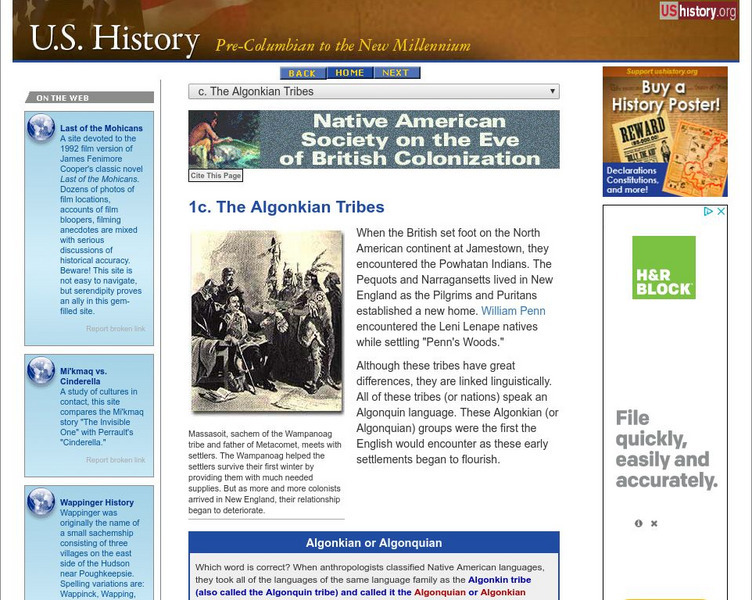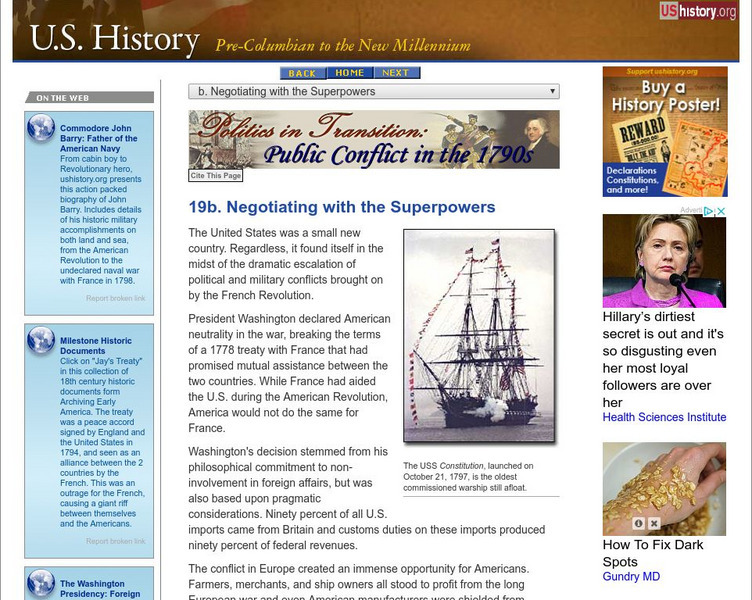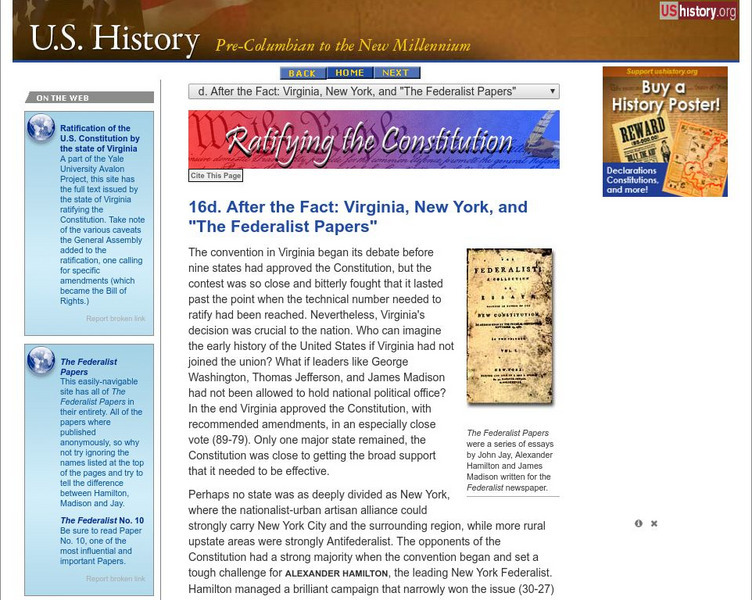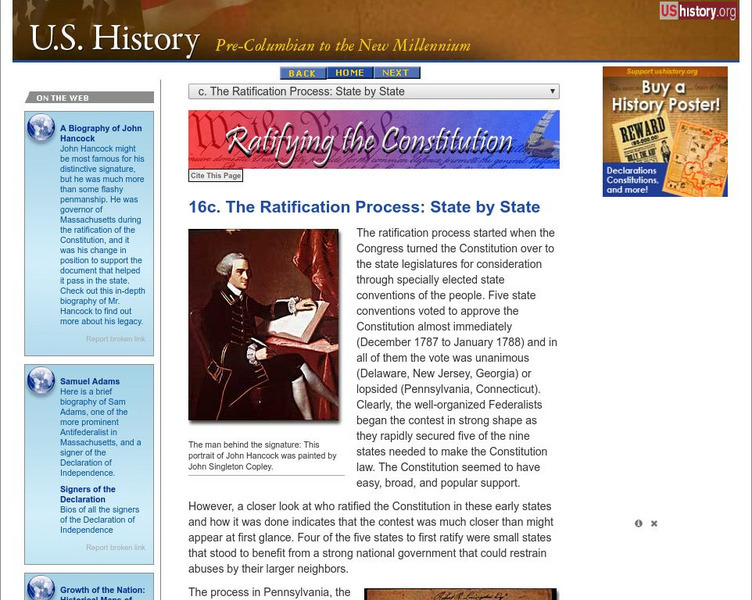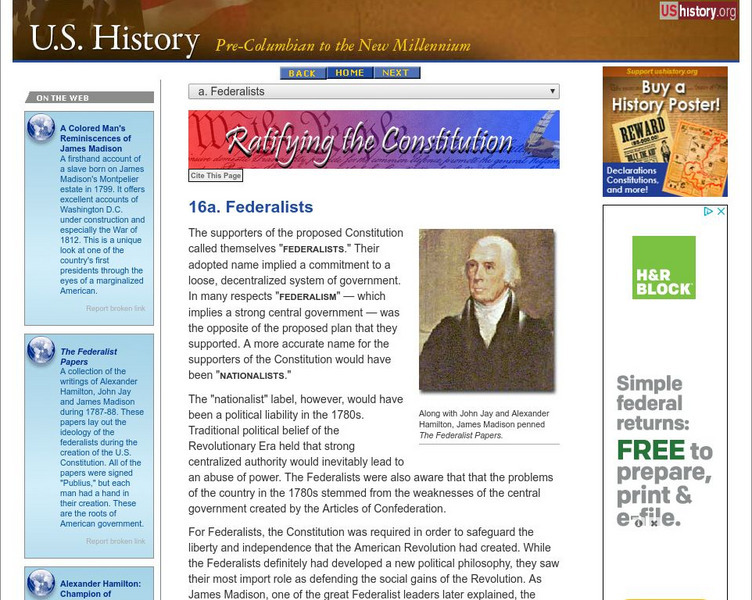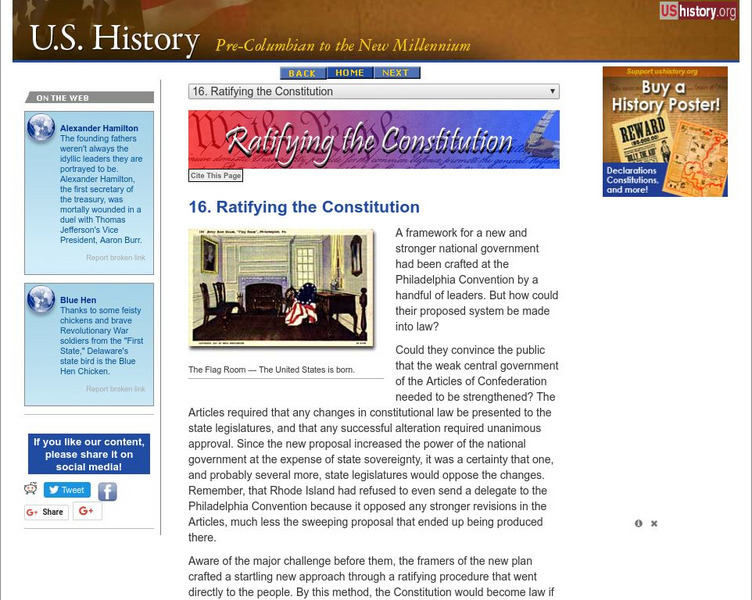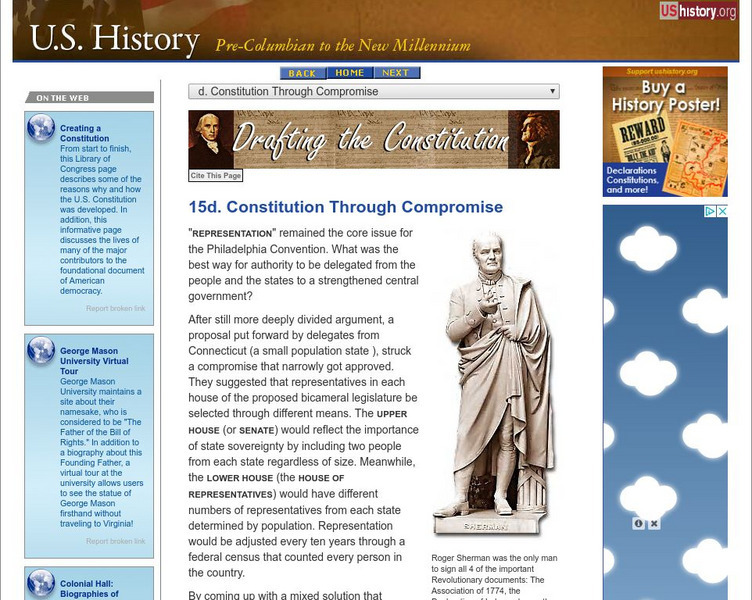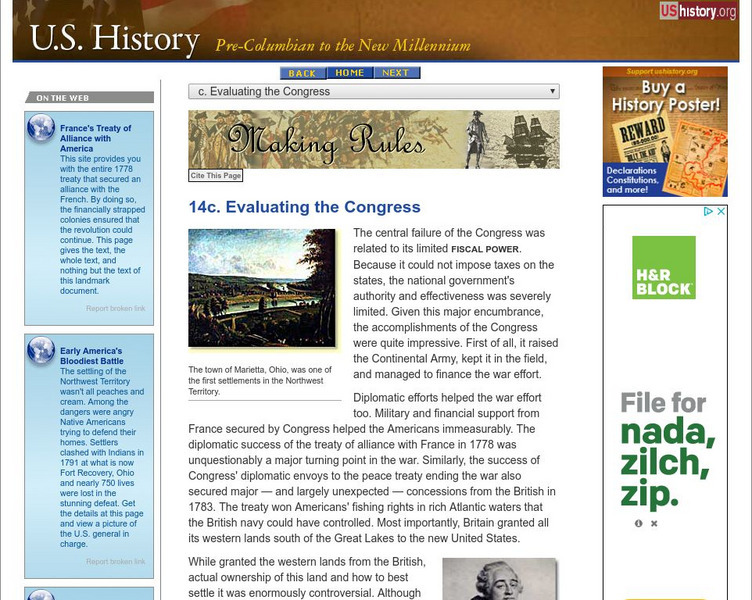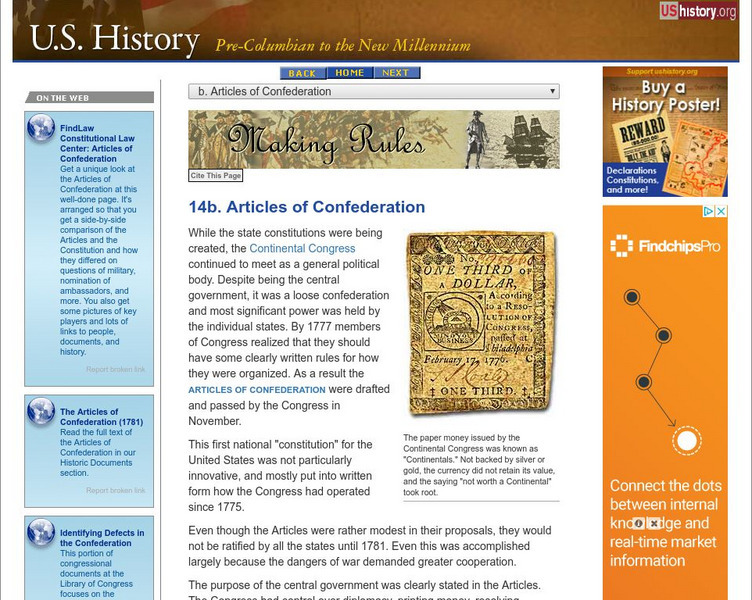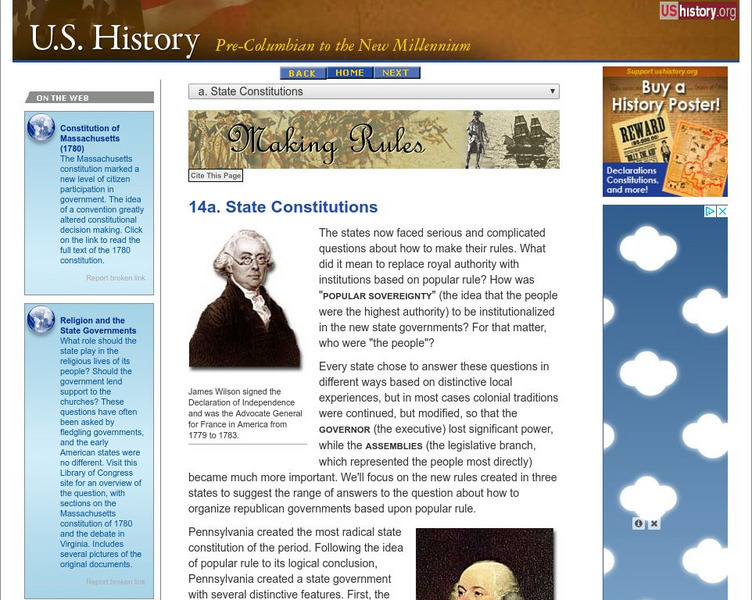Independence Hall Association
U.s. History: Gabriel's Rebellion: Another View of Virginia
Gabriel Prosser, a skilled slave, planned a revolt as a way to carry out the ideals of the American Revolution and give freedom to slaves. Read about what his vision was, what group of white men might be helpful to his cause, and what...
Independence Hall Association
U.s. History: Jeffersonian Ideology
An easy to understand overview of the thinking of Thomas Jefferson in terms of politics and the role of the people in political action. See what he feared as the nation was becoming industrialized, and read about the contradictions in...
Independence Hall Association
U.s. History: The Election of 1800
The election of 1800 was momentous for many reasons. Read about the defeat of John Adams and his Federalist policies, and see how Thomas Jefferson became president because of a crucial vote by a Federalist.
Independence Hall Association
U.s. History: Jeffersonian America: A Second Revolution?
Read about the peaceful "revolution" that occurred in the election of 1800 when the party in power, the Federalists, was defeated in a democratic election by the Democratic-Republicans. See how this showed that the ideals of the new...
Independence Hall Association
U.s. History: The Iroquois Tribes
The Iroquois were a group of five tribes linked by their language and similar culture. Read about why the Iroquois were such a great example of the elevated role of women in the tribes, the complex lifestyle they had, and their political...
Independence Hall Association
U.s. History: The Algonkian Tribes
A good look at the Algonkian tribes that ranged along the Atlantic coast, although different in many ways, but connected linguistically. Read about the Wampanoags, who met the Pilgrims, and the Powhatans, who helped John Smith and his...
Independence Hall Association
U.s. History: The Life and Times of John Adams
John Adams was an important Founding Father, whose importance was not appreciated when he was president. Read about how his early life shaped his strongly held beliefs, and see how he would not put partisan politics above those beliefs.
Independence Hall Association
U.s. History: Two Parties Emerge
Although George Washingon denounced the creation of political parties, they came roaring into play in the election of 1796 in which John Adams, representing the Federalists, ran against Thomas Jefferson, who represented the...
Independence Hall Association
U.s. History: Negotiating With the Superpowers
Read about the problems President George Washington had with foreign affairs. Both France and Great Britain ignored American sovereignty and claims of neutrality. Read about Great Britain's disregard of the Treaty of Paris which ended...
Independence Hall Association
U.s. History: Politics in Transition: Public Conflict in the 1790s
A brief overview of the struggles taking place in politics in the 1790s. Even the honorable George Washington was not sheltered from contentious criticism. Read about the foreign and domestic problems that loomed in that decade.
Independence Hall Association
U.s. History: Native American Resilience and Violence in the West
Learn about the struggles the new United States government had in coming to terms with the various Native American tribes who lived in the new country.
Independence Hall Association
U.s. History: The Bill of Rights
The Constitution spelled out the powers of the national government, but many Anti-federalists felt there should be equally explicit a guarantee of individual rights. Read about the compiliation of what became known as the Bill of Rights...
Independence Hall Association
U.s. History: Unsettled Domestic Issues
The new United States government faced many threats to its success. Read this overview of the possible problems.
Independence Hall Association
U.s. History: The Antifederalists' Victory in Defeat
By 1788 eleven states ratified the Constitution, more than enough to put it into effect as the document establishing rules for the nation. Read about the goals of the Federalists in estabilishing a national government and find out how...
Independence Hall Association
U.s. History: After the Fact: Virginia, New Yok, and "The Federalist Papers"
Read about the necessity for Virginia and New York to support the ratification of the Constitution. See what influenced the vote in Virginia and how the legislature of New York was finally convinced.
Independence Hall Association
U.s. History: The Ratification Process: State by State
The ratification of the Constitution was placed at the hands of the state legislatures. Read about which states supported the ratification, which were opposed, and why. Find out why, even after the requisite number of states had voted...
Independence Hall Association
U.s. History: Antifederalists
The Anti-federalists, those who opposed the ratification of the Constitution, were a diverse group. They did have specific fears about carrying out the precepts of the Constitution. Read about their fears, especially the main one, no...
Independence Hall Association
U.s. History: Federalists
A brief look at the men who supported the new Constitution and the reasons they supported it.
Independence Hall Association
U.s. History: Ratifying the Constitution
The delegates to the Constititional Convention produced a new governing document for the new United States. Read about how they determined to take the ratification process to the people of the states.
Independence Hall Association
U.s. History: Constitution Through Compromise
Read about how compromises were reached at the Philadelphia convention that dealt with issues between large and small states, and slave and free states. Take the quick quiz to assess knowledge about the writing of the Constitution.
Independence Hall Association
U.s. History: The Economic Crisis of the 1780s
Find out how massive debt and trade restrictions threatened the very existence of the new United States. See how debt affected the central and state governments as well as the average citizen.
Independence Hall Association
U.s. History: Evaluating the Congress
Although there were some glaring weaknesses for the central government under the Articles of Confederation, there were some stunning accomplishments. Read about the successes and think about how important they were for the future of the...
Independence Hall Association
U.s. History: Articles of Confederation
During the Revolutionary War, it was necessary to put together some sort of central government, primarily to raise and pay an army. Read about the rules finally passed by Congress in 1777, called the Articles of Confederation. See what...
Independence Hall Association
U.s. History: State Constitutions
The new states did a great deal of experimentation within the bounds of the new republican ideals. Read about three very different takes on how a state should be organized governmentally.



